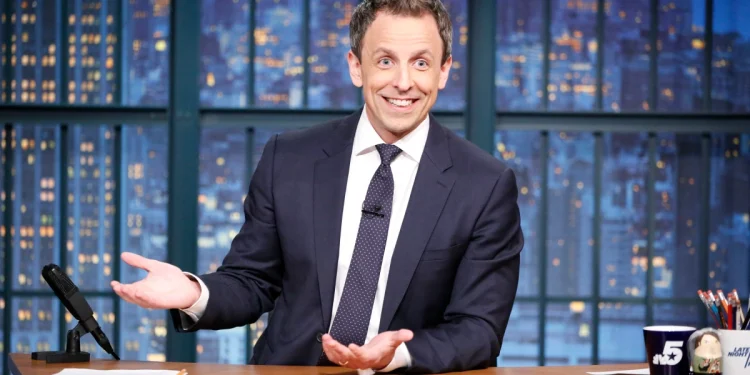Bad News for ‘Trump-Adjacent Weirdos’ Delights Seth Meyers

Late-night talk show host Seth Meyers has always been known for his biting commentary on politics and current events. Recently, Meyers found delight in the bad news for “Trump-adjacent weirdos,” particularly Mike Lindell, the CEO of MyPillow[4]. In a recent episode of “Late Night with Seth Meyers,” the host discussed the news that a defamation suit against Lindell over his claims of election fraud would proceed[1]. Meyers enjoyed seeing Lindell’s reaction to the news on camera, highlighting his satisfaction with the legal troubles faced by what he calls “Trump-adjacent weirdos”[3]. This article will explore Meyers’ delight in the bad news for these individuals and raise questions about the role of late-night talk shows in political discourse and their impact on public opinion.
The Delight in Bad News
During a recent episode of his show, Meyers gleefully reported on Lindell’s reaction to the news that the lawsuit would be moving forward[1]. The New York Times even ran a headline stating, “Bad news for ‘Trump-adjacent weirdos’ delights Seth Meyers”[5]. Meyers’ enjoyment of Lindell’s legal troubles is not surprising given his vocal opposition to former President Trump and his administration[2]. Meyers has been particularly vocal about his delight in the recent legal troubles of what he refers to as “Trump-adjacent weirdos”[1]. This raises questions about the role of late-night talk shows in political discourse and the impact they have on public opinion[2].
Late-night talk shows like “Late Night with Seth Meyers” have become a popular platform for political commentary and satire. These shows often provide a unique perspective on current events, offering a blend of humor and criticism. However, some argue that these shows can also shape public opinion and influence political discourse[2]. Meyers’ delight in the misfortunes of “Trump-adjacent weirdos” raises questions about the line between entertainment and political commentary on late-night talk shows[4].
The Role of Late-Night Talk Shows
Late-night talk shows have a long history of providing a platform for political commentary. Hosts like Johnny Carson, David Letterman, and Jon Stewart have all used their shows to offer their take on current events. In recent years, hosts like Seth Meyers, Stephen Colbert, and Trevor Noah have continued this tradition, using their platforms to critique political figures and policies[2].
These shows often attract a younger audience who may not consume news through traditional channels. As a result, late-night talk shows have the potential to shape public opinion and influence political discourse[2]. Meyers’ delight in the legal troubles of “Trump-adjacent weirdos” may resonate with his audience and reinforce their existing beliefs about these individuals[3]. However, it is important to consider the potential consequences of blurring the line between entertainment and political commentary.
The Impact on Public Opinion
Late-night talk shows like “Late Night with Seth Meyers” have a significant reach and influence. They provide a unique platform for hosts to express their opinions and shape public discourse. However, it is essential to recognize that these shows are ultimately entertainment and should not be seen as unbiased sources of news[4].
Meyers’ delight in the bad news for “Trump-adjacent weirdos” may reinforce existing beliefs among his audience. Those who already oppose these individuals may find validation in Meyers’ commentary, while those who support them may dismiss his views as biased[3]. This raises questions about the role of late-night talk shows in shaping public opinion and the responsibility of hosts to present a balanced perspective.
Conclusion
Late-night talk show host Seth Meyers’ delight in the bad news for “Trump-adjacent weirdos” like Mike Lindell raises questions about the role of these shows in political discourse and their impact on public opinion. While late-night talk shows provide a platform for political commentary and satire, it is important to recognize that they are ultimately entertainment and should not be seen as unbiased sources of news. Meyers’ delight may resonate with his audience and reinforce their existing beliefs, but it is crucial to consider the potential consequences of blurring the line between entertainment and political commentary. As viewers, it is essential to approach these shows with a critical eye and seek out diverse perspectives to form a well-rounded understanding of current events.





